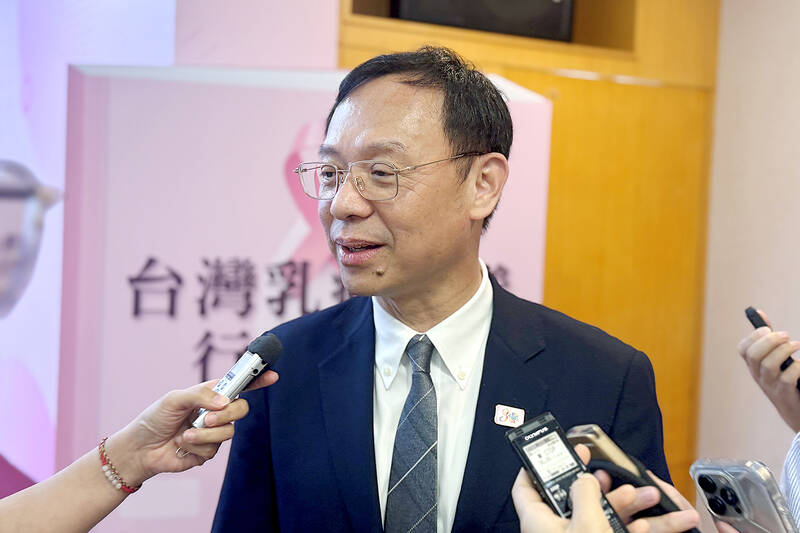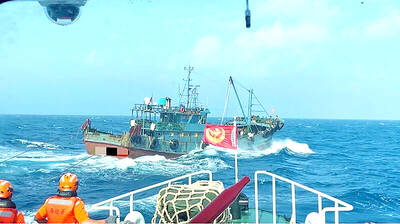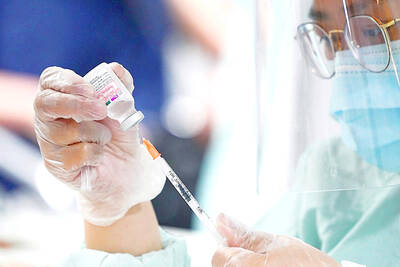People could soon be able to accumulate “health coins” when they get vaccinated, or undergo health screenings or physical exams, which could be used to offset the cost of health-related products, Minister of Health and Welfare Shih Chung-liang (石崇良) said yesterday.
The policy is scheduled to be implemented in the first quarter of next year, Shih told reporters before attending the opening of an advocacy workshop on breast cancer.
President William Lai (賴清德) earlier unveiled his “Healthy Taiwan” vision, aiming to cut by one-third the standardized mortality rate of chronic diseases associated with hypertension, hyperlipidemia and hyperglycemia by 2030.

Photo: Chiu Chih-jou, Taipei Times
One of the strategies includes expanding publicly funded cancer screenings to cover more age groups and more types of cancer.
“Although public awareness of the importance of cancer screening has increased, participation rates for most types of screenings have plateaued,” Shih said. “With the president’s vision for a healthier Taiwan in mind, we need to consider ways to further raise people’s awareness of personal healthcare, and thus the ‘health coin’ idea was born.”
The ministry has already introduced the health account book, allowing people to view their past medical appointments and various tests or screenings, Shih said.
In the future, public or privately funded vaccinations, cancer screenings and physical exams could all be converted into “coins,” which could provide discounts on healthcare-related services or products, he said.
For example, people could receive 100 “coins” for getting a dose of a publicly funded vaccine, he said.
The coins could be used to access sports facilities, or purchase medication or healthcare products, he said.
“In the past, public health awareness campaigns mainly focused on reducing the spread of disease or decreasing the burden on the national healthcare system. However, most people did not feel like they were receiving any immediate benefits if they followed the government’s suggestions. The health coin, on the other hand, serves as an instant rebate for the actions they take for their personal health,” Shih said.
The ministry would work out details with the Ministry of Sports and Ministry of Education before officially implementing the policy during the first quarter next year.
In related news, the government would soon stop using the National Health Insurance Fund to subsidize premiums paid by low and medium-income families, indigenous peoples, physically and mentally challenged personnel, and employees on paternity leave, following amendments to the Enforcement Rules of the National Health Insurance Act (全民健康保險法施行細則), the ministry said.
The amendment to articles 45 and 73 of the enforcement rules were subject to public review for 14 days, but the ministry said that it did not receive any input on the proposed change when that period expired yesterday.
Article 3 of the National Health Insurance Act (全民健康保險法) stipulates that the government shall bear no less than 36 percent of the total annual insurance budget after deducting statutory revenue for this insurance program each year.
If the government’s budget allocation as stipulated by law falls short of covering 36 percent of the annual insurance budget after deducting statutory revenue, the ministry shall allocate additional funds to cover the shortfall.
The enforcement rules list the types of people whose health insurance premiums would be subsidized.
“The National Health Insurance Act initially stipulated that the government would only subsidize premiums paid by low-income families, but the enforcement rules expanded the coverage to include indigenous peoples, physically and mentally challenged people, and employees on paternity leave. As a result, a shortfall of the National Health Insurance Fund has begun to emerge,” Department of Social Insurance Acting Director Chen Chen-hui (陳真慧) said.
This year, the fund’s shortfall would reach NT$13.4 billion (US$438.7 million), she said.
“The proposed changes to the enforcement rules are to ensure that the social welfare expenditure would not affect the financial soundness of the National Health Insurance Fund. Subsidies for low-income families, indigenous peoples and workers on paternity leave should be distributed based on social welfare laws,” Chen said.
The new policy is scheduled to take effect at the end of this month, she said, adding that the central government would provide NT$13.4 billion and NT$13.89 billion to replenish the fund this year and next year respectively.

The Republic of China (ROC) is celebrating its 114th Double Ten National Day today, featuring military parades and a variety of performances and speeches in front of the Presidential Office in Taipei. The Taiwan Taiko Association opened the celebrations with a 100-drummer performance, including young percussionists. As per tradition, an air force Mirage 2000 fighter jet flew over the Presidential Office as a part of the performance. The Honor Guards of the ROC and its marching band also heralded in a military parade. Students from Taichung's Shin Min High School then followed with a colorful performance using floral imagery to represent Taiwan's alternate name

COGNITIVE WARFARE: Chinese fishing boats transmitting fake identification signals are meant to test Taiwan’s responses to different kinds of perceived incursions, a report said Chinese vessels are transmitting fake signals in Taiwan’s waters as a form of cognitive warfare, testing Taipei’s responses to various types of incursions, a report by the Institute for the Study of War said on Friday. Several Chinese fishing vessels transmitted fake automatic identification system (AIS) signals in Taiwan’s waters last month, with one mimicking a Russian warship and another impersonating a Chinese law enforcement vessel, the report said. Citing data from Starboard Maritime Intelligence, the report said that throughout August and last month, the Chinese fishing boat Minshiyu 06718 (閩獅漁06718) sailed through the Taiwan Strait while intermittently transmitting its own AIS

CHINESE INFILTRATION: Medical logistics is a lifeline during wartime and the reported CCP links of a major logistics company present a national security threat, an expert said The government would bolster its security check system to prevent China from infiltrating the nation’s medical cold chain, a national security official said yesterday. The official, who wished to stay anonymous, made the remarks after the Chinese-language magazine Mirror Media (鏡周刊) reported that Pharma Logistics (嘉里醫藥物流) is in charge of the medical logistics of about half of the nation’s major hospitals, including National Taiwan University Hospital and Taipei Veterans General Hospital. The company’s parent, Kerry TJ Logistics Co (嘉里大榮物流), is associated with the National Committee of the Chinese People’s Political Consultative Conference (CPPCC) and the Chinese People’s Liberation Army (PLA), the

COVETED PRIZE: The US president would be a peace prize laureate should he persuade Xi Jinping to abandon military aggression against Taiwan, William Lai said US President Donald Trump should get the Nobel Peace Prize should he be able to convince Chinese President Xi Jinping (習近平) to abandon the use of force against Taiwan, President William Lai (賴清德) told a conservative US radio show and podcast in an interview. The US is Taiwan’s most important international backer, despite the absence of formal ties, but since Trump took office earlier this year he has not announced any new arms sales to the nation. Trump could meet Xi at the APEC summit in South Korea on Oct. 31 and Nov. 1. Lai, speaking on The Clay Travis and Buck Sexton